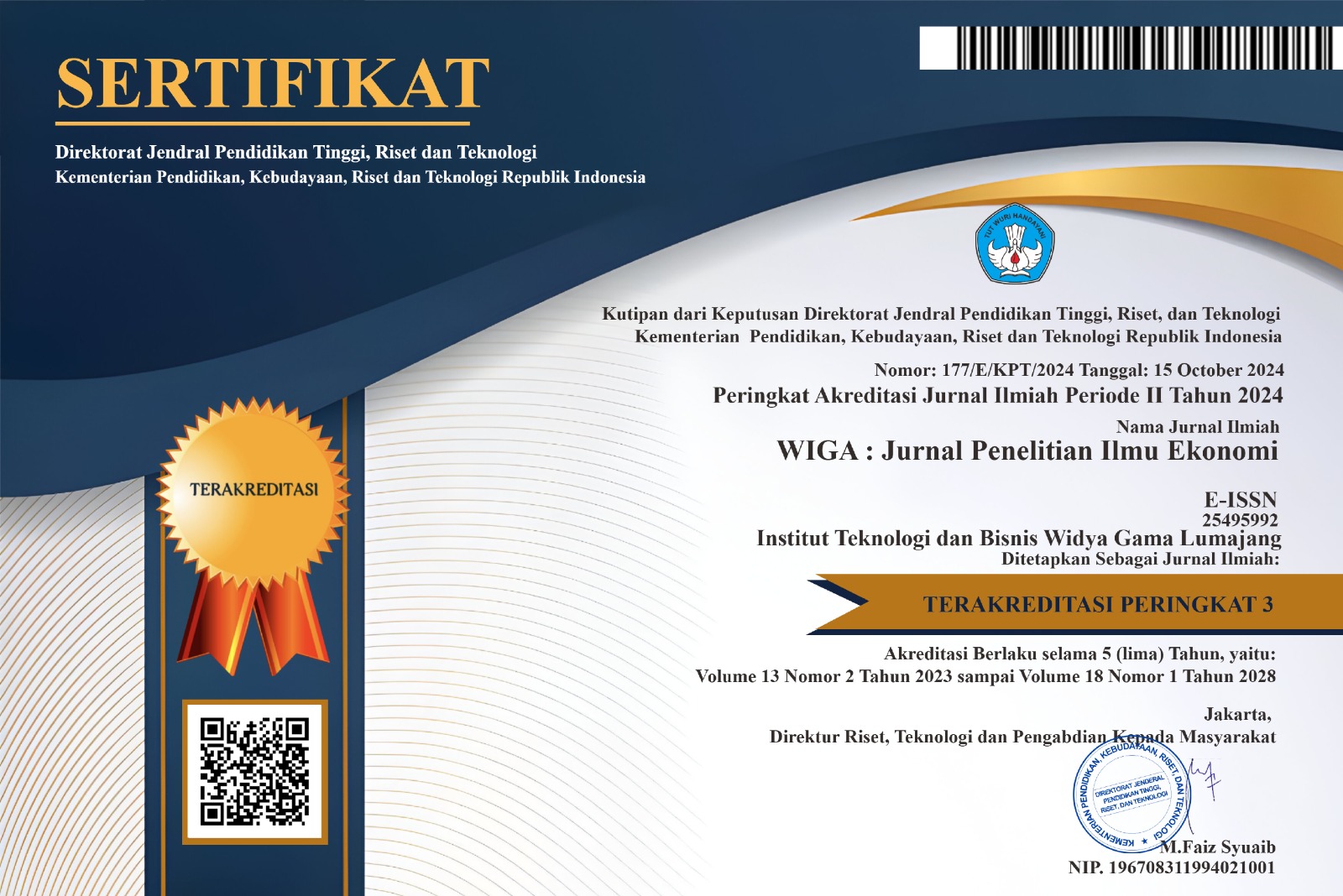Tawhid String Relation and Itsar Concept of Islamic Bank in Information Technology and Competitive Advantage Issues
DOI:
https://doi.org/10.30741/wiga.v13i1.999Keywords:
Value Creation, Tawhid String Relation, Islamic Bank, ItsarAbstract
The current Covid-19 pandemic phenomenon that has shaken the world economy, including Indonesia, has caused social problems, including the increasing number of poor people. The purpose of this conceptual paper is to conduct a study related to the business model of Islamic banks, which is based on the Tawhid String Relations concept and is managed with the Itsar concept that can contribute to helping overcome social problems in alleviating poverty. The method used is the literature review. Social instruments, product innovation, and Islamic banking services are aimed at the benefit of the community. Also, the management of Islamic banks should be oriented towards managing Islamic banks to get Allah's pleasure, which is to provide benefits to the ummah.
Downloads
References
Abd Razak, A. H. (2019). Multiple Sharia’ board directorship: a Maslahah (public interest) perspective. Journal of Islamic Marketing, 11(3), 745–764. https://doi.org/10.1108/JIMA-10-2018-0185
Agustiyanti. (2020). Ekonomi Terpukul Corona, Penduduk Miskin RI Bertambah Jadi 26,43 Juta - Makro Katadata.co.id. Retrieved September 8, 2020, from https://katadata.co.id/agustiyanti/finansial/5f0ea4611c235/ekonomi-terpukul-corona-penduduk-miskin-ri-bertambah-jadi-26-43-juta
Alika, R., & Setyowati, D. (2020). Pemerintah Rancang Lima Program Utama Atasi Corona & Pemulihan Ekonomi - Nasional Katadata.co.id. Retrieved August 27, 2020, from https://katadata.co.id/desysetyowati/berita/5f1efc3fea1de/pemerintah-rancang-lima-program-utama-atasi-corona-pemulihan-ekonomi
Anshary, M., Labetubun, H., Kembauw, E., Hasan, M., Arifudin, O., Yulistiyono, A., … Solikin, L. N. (2021). Sistem Ekonomi Indonesia (first). Bandung: Widina Bhakti Persada Bandung. Retrieved from www.penerbitwidina.com
Arafah, W., & Nugroho, L. (2016). Maqhashid Sharia in Clean Water Financing Business Model at Islamic Bank. International Journal of Business and Management Invention (IJBMI), 5(2), 22–32.
Arshad, R., Othman, S., & Othman, R. (2012). Islamic Corporate Social Responsibility, Corporate Reputation and Performance. World Academy of Science, Engineering and Technology, 6(64), 1070. Retrieved from http://search.proquest.com/docview/1349445808?accountid=26646
Ascarya, Rahmawati, S., & Tanjung, H. (2018). Design the Roadmap of Holistic Financial Inclusion for Baitul Maal wat Tamwil. Tazkia Islamic Finance and Business Review, 12(1), 1–32. https://doi.org/10.30993/tifbr.v12i1.112
Aziz, R. M. (2012). New Paradigm on Sinlammim Kafah in Islamic Economics. Signifikan, 1(2), 139–148.
Bahari, N. P., Nugroho, L., Badawi, A., & Hidayah, N. (2021). Analisa Manfaat Pembiayaan Gadai Emas Syariah: Studi Kasus Bank Syariah Mandiri-Tomang Raya. Jurnal REKSA: Rekayasa Keuangan, Syariah, Dan Audit, 8(1), 15–30.
Bonaccorsi, G., Pierri, F., Cinelli, M., Flori, A., Galeazzi, A., Porcelli, F., … Pammolli, F. (2020). Economic and social consequences of human mobility restrictions under COVID-19. In Proceedings of the National Academy of Sciences of the United States of America (Vol. 117, pp. 15530–15535). https://doi.org/10.1073/pnas.2007658117
Bramasta, D. B., & Hardiyanto, S. (2020). Update Virus Corona di Dunia 26 Agustus: 24 Juta Orang Terinfeksi | 10 Negara dengan Kasus Covid-19 Terbanyak Halaman all - Kompas.com. Retrieved August 27, 2020, from https://www.kompas.com/tren/read/2020/08/26/080500765/update-virus-corona-di-dunia-26-agustus--24-juta-orang-terinfeksi-10-negara?page=all
Choudhury, M. A. (2018). The ontological law of Tawhid contra ‘Shari’ah-compliance’ in Islamic portfolio finance. International Journal of Law and Management, 60(2), 413–434. https://doi.org/10.1108/IJLMA-01-2017-0001
Cohan, U. W. (2020). Forecasting the Economic Impact of Coronavirus on Developing Countries Case of Pakistan (No. Working Paper ID: EC016UC). Pakistan. Retrieved from https://papers.ssrn.com/sol3/papers.cfm?abstract_id=3563616
Davis, J. H., Schoorman, F. D., & Donaldson, L. (1997). Toward a Stewardship Theory of Management. Academeny Of Management Review, 22(1), 20–47.
Donaldson, L., & Davis, J. H. (1991). Stewardship theory or agency theory: CEO governance and shareholder return. Australian Journal of Management, 16(1), 49–64.
Fama, E. F. (1969). The Adjustment of Stock Prices to New Information. International Economic Review, 10, 1–21.
Faturohman, T., Rasyid, M. F. A., Rahadi, R. A., Darmansyah, A., & Afgani, K. F. (2021). The Potential Role of Islamic Social Finance in the Time of COVID-19 Pandemic. Review of Integrative Business and Economics Research, 10(1), 95–105. Retrieved from http://buscompress.com/uploads/3/4/9/8/34980536/riber_10-s1_10_u20-063_95-105.pdf
Fidiana, F. (2020). Compliance behaviour from the holistic human nature perspective. Journal of Islamic Accounting and Business Research, 11(5), 1145–1158. https://doi.org/10.1108/JIABR-11-2016-0142
Gholami, S. (2011). Value Creation Model through Corporate Social Responsibility (CSR). International Journal of Business and Management, 6(9), 148–154. https://doi.org/10.5539/ijbm.v6n9p148
Herliansyah, Y., Nugroho, L., Ardilla, D., & Putra, Y. M. (2020). The Determinants of Micro , Small and Medium Enterpreneur (MSME) Become Customer of Islamic Banks (Religion, Religiousity and Location of Islamic Banks). In The 1st Annual Conference Economics, Business, and Social Sciences (pp. 1–10). https://doi.org/10.4108/eai.26-3-2019.2290775
Hidayati, F. (2016). Konsep Altruisme dalam Perspektif Ajaran Agama Islam (ITSAR). Psikoislamika : Jurnal Psikologi Dan Psikologi Islam, 13(1), 59. https://doi.org/10.18860/psi.v13i1.6410
Ihle, R., Rubin, O. D., Bar-Nahum, Z., & Jongeneel, R. (2020). Imperfect food markets in times of crisis: economic consequences of supply chain disruptions and fragmentation for local market power and urban vulnerability. Food Security, (2019). https://doi.org/10.1007/s12571-020-01084-1
Ihwanudin, N., Maulida, S., Ilham Akbar Fatriansyah, A., Sari Rahayu, S., Nugroho, L., Widyastuti, S., … Arzhi Jiwantara, F. (2020). Pengantar Perbankan Syariah (Konsep, Regulasi & Praktis). Widina Bhakti Persada Bandung. Retrieved from www.penerbitwidina.com
Ikhwan, M. (2016). Tafsir alquran dan perkembangan zaman: merekonstruksi konteks dan menemukan makna. Nun: Jurnal Studi Alquran Dan Tafsir Di Nusantara, 2(1), 1–23.
Jandoc, K., Mendoza, A., & Quimbo, S. L. (2020). Vulnerable to the Virus: Globally-Oriented Manufacturing Firms at Risk From the Spread of COVID-19 (No. Discussion Paper No. 2020-01). Philippines. Retrieved from https://econ.upd.edu.ph/dp/index.php/dp/article/viewFile/1524/1005
Jensen, M., & Meckling, W. (1976). Theory of the firm: Managerial behaviour, agency costs and ownership. Strategic Management Journal, 21(4), 1215–1224. Retrieved from http://search.ebscohost.com/login.aspx?direct=true&db=buh&AN=12243301&site=ehost-live
Kasdi, A. (2020). Volume 17 Number 1 2020 Resilience of Muslim Families in the Pandemic Era: Indonesian Millenial Muslim Community’s Response Against Covid-19. Jurnal Penelitian, 17(1), 81–94.
Kumar, A., Singh, R., Kaur, J., Pandey, S., Sharma, V., Thakur, L., … Kumar, N. (2021). Wuhan to World: The COVID-19 Pandemic. Frontiers in Cellular and Infection Microbiology, 11(March), 1–21. https://doi.org/10.3389/fcimb.2021.596201
Lestari, C., Lubis, N., & Widayanto. (2015). Pengaruh Jaringan Usaha, Inovasi Produk dan Persaingan Usaha Terhadap Perkembangan Usaha Mikro, Kecil dan Menengah (Studi Pada IKM Makanan di Kabupaten Kuningan, Jawa Barat). Jurnal Ilmu Administrasi Bisnis, 4(2), 185–196.
Li, N., Kirkman, B. L., & Porter, C. O. L. H. (2020). Toward a Model of Work Team Altruism. Academy of Management, 39(4), 541–565.
Mudzhar, M. A. (2014). Revitalisasi Maqasid al-Shari’ah dalam Pengembangan Ekonomi Syariah di Indonesia (Studi Kasus atas Fatwa-fatwa DSN-MUI Tahun 2000-2006). Indo-Islamika, 4(1), 1–19.
Muniarty, P., Bairizki, A., Sudirman, A., Wulandari, Anista, J. S. A., Elistia, … Fitriana. (2021). Kewirausahaan. Widina Bhakti Persada Bandung (first). Bandung. Retrieved from https://repository.penerbitwidina.com/media/343827-kewirausahaan-09bb1a47.pdf
Muzakki, F. (2020). the Global Political Economy Impact of Covid-19 and. Journal of Social Political Sciences JSPS, 1(2), 76–93.
Nichter, S., & Goldmark, L. (2009). Small Firm Growth in Developing Countries. World Development, 37(9), 1453–1464. https://doi.org/10.1016/j.worlddev.2009.01.013
Nugraha, E., Nugroho, L., Lindra, C., & Sukiati, W. (2020). Maqashid Sharia Implementation in Indonesia and Bahrain. Etikonomi, 19(1), 155–168. https://doi.org/10.15408/etk.v19i1.14655
Nugroho, L., Badawi, A., & Hidayah, N. (2019). Discourses of Sustainable Finance Implementation in Islamic Bank (Cases Studies in Bank Mandiri Syariah 2018). International Journal of Financial Research, 10(6). https://doi.org/10.5430/ijfr.v10n6p108
Nugroho, L., Badawi, A., Nugraha, E., & Putra, Y. M. (2021). What Determines Islamic Performance Ratio of Islamic Banking in Indonesia: An Analysis Using Financing Deposit to Ratio as Moderator. SHARE: Jurnal Ekonomi Dan Keuangan Islam, 10(1), 104–123. https://doi.org/10.22373/share.v10i1.9314
Nugroho, L., Hidayah, N., & Badawi, A. (2018). The Islamic Banking , Asset Quality : “Does Financing Segmentation Matters” (Indonesia Evidence). Mediterranean Journal of Social Sciences, 9(5), 221–235. https://doi.org/10.2478/mjss-2018-0154
Nugroho, L., Hidayah, N., Badawi, A., & Mastur, A. A. (2020f). The urgency of Leadership in Islamic Banking Industries Performance. In The 1st Annual Conference Economics, Business, and Social Sciences (pp. 1–7). https://doi.org/10.4108/eai.26-3-2019.2290681
Nugroho, L., Meiwanto Doktoralina, C., Indriawati, F., Safira, S., & Yahaya, S. (2020c). Microeconomics and Tawhid String Relation Concept (TSR). International Journal of Economics and Business Administration (IJEBA), 8(3), 293–306. https://doi.org/10.35808/ijeba/516
Nugroho, L., Nugraha, E., & Badawi, A. (2020a). Sustainable Finance Portfolio Analysis in Islamic Bank (Segment Perspective). International Journal of Commerce and Finance, 6(2), 226–240.
Nugroho, L., Nugraha, E., & Badawi, A. (2020b). The Determinant of Islamic Performance Ratio: Do Financing Deposit Ratio, Financing Quality, and Return on Asset Ratio Matters? Global Review of Islamic Economics and Business, 8(2), 113–122.
Nugroho, L., Suganda, A. D., Febrianty, F., Hamid, M. A. L., Ihwanudin, N., Trimulato, T., … Anwar, A. (2020d). Pengantar Perbankan Syariah. Bandung: Widina Bhakti Persada Bandung. Retrieved from www.penerbitwidina.com
Nugroho, L., & Tamala, D. (2018). Persepsi Pengusaha UMKM terhadap Peran Bank Syariah. Jurnal SIKAP, 3(1), 49–62.
Nugroho, L., Utami, W., Harnovinsah, & Doktorlina, C. M. (2020e). Covid-19 and The Potency of Disruption on The Islamic Banking Performance (Indonesia Cases). International Journal of Economic and Business Applied, 1(1), 11–25.
Nugroho, L., Utami, W., Sukmadilaga, C., & Fitrijanti, T. (2017). The Urgency of Allignment Islamic Bank to Increasing the Outreach (Indonesia Evidence). International Journal of Economics and Financial Issues, 7(4), 283–291.
Nurhidayat. (2020). Pendekatan Ekonomi Syariah Dalam Menyelesaikan Masalah Ekonomi Akibat Pandemi COVID-19. Jurnal Pemikiran Dan Pengembangan Perbankan Syariah, 6(1), 17–34.
Okada, P., Buathong, R., Phuygun, S., Thanadachakul, T., Parnmen, S., Wongboot, W., … Maurer-Stroh, S. (2020). Early transmission patterns of coronavirus disease 2019 (COVID-19) in travellers from Wuhan to Thailand, January 2020. Eurosurveillance, 25(8). https://doi.org/10.2807/1560-7917.ES.2020.25.8.2000097
Pessi, A. B. (2011). Religiosity and altruism: Exploring the link and its relation to happiness. Journal of Contemporary Religion, 26(1), 1–18. https://doi.org/10.1080/13537903.2011.539835
Pratiwi, A. (2016). Islamic banking contribution in sustainable socioeconomic development in Indonesia: an epistemological approach. Humanomics, 32(2), 98–120. https://doi.org/10.1108/H-12-2015-0085
Priyanka, A., Candra, S. A., & Saubani, A. (2020). Empat Sektor Ekonomi yang Paling Tertekan Pandemi Covid-19 | Republika Online. Retrieved August 27, 2020, from https://republika.co.id/berita/q83llp409/empat-sektor-ekonomi-yang-paling-tertekan-pandemi-covid19
Ramadhan, B. M., & Ryandono, M. N. H. (2015). Etos Kerja Islami pada Kinerja Bisnis Pedagang Muslim Pasar Besar Kota Madiun. Jurnal Ekonomi Syariah Teori Dan Terapan, 2(4), 274–287.
Safitri, Y., Nugroho, L., Permana, S. D. H., Zonyfar, C., Purnia, D. S., Napitulu, D., … Tallo, A. J. (2020). Gotong Royong Menghadapi Pandemi Covid-19 “Ide dan Solusi.” (T. Q. Media, Ed.), CV Penerbit Qiara Media (First). Pasuruan, Jawa Timur: Penerbit Qiara Media.
Seetharaman, P. (2020). Business models shifts: Impact of Covid-19. International Journal of Information Management, 54(June), 1–4. https://doi.org/10.1016/j.ijinfomgt.2020.102173
Shenton, A. K. (2004). Strategies for ensuring trustworthiness in qualitative research projects. Education for Information, 22, 63–75.
Siebold, N. (2020). Reference points for business model innovation in social purpose organizations: A stakeholder perspective. Journal of Business Research, (January), 1–10. https://doi.org/10.1016/j.jbusres.2020.01.032
Sukirno. (2020). Bank Syariah Mandiri Siapkan Aplikasi Zakat Digital - TrenAsia. Retrieved September 13, 2020, from https://www.trenasia.com/bank-syariah-mandiri-siapkan-aplikasi-zakat-digital/
Suzuki, Y., & Miah, M. D. (2016). Altruism, reciprocity and Islamic equity finance. International Journal of Islamic and Middle Eastern Finance and Management, 9(2), 205–221. https://doi.org/10.1108/IMEFM-09-2014-0091
Utami, W. (2020). Altruistik Managerial sebagai Solusi Meningkatkan Dasa Saing di Era Digital. In Eksistensi Bisnis Islami di Era Revolusi Industri 4.0 (pp. 61–83). Bandung: Widina Bhakti Persada Bandung.
Wajdi Dusuki, A. (2008). Understanding the objectives of Islamic banking: a survey of stakeholders’ perspectives. International Journal of Islamic and Middle Eastern Finance and Management, 1(2), 132–148. https://doi.org/10.1108/17538390810880982
Wiratmini, N. P. E., & Rini, A. S. (2020). Bantu Tangani Covid-19, Mandiri Syariah dan Pegawai Salurkan Paket Pangan - Finansial Bisnis.com. Retrieved September 13, 2020, from https://finansial.bisnis.com/read/20200615/231/1252770/bantu-tangani-covid-19-mandiri-syariah-dan-pegawai-salurkan-paket-pangan
Yang, W. (2017). Does ‘compulsory volunteering’ affect subsequent behavior? Evidence from a natural experiment in Canada. Education Economics, 25(4), 394–405. https://doi.org/10.1080/09645292.2016.1182622
Zain, M. M., Darus, F., Yusof, H., Amran, A., Fauzi, H., Purwanto, Y., & Naim, D. M. A. (2014). Corporate ibadah: an Islamic Perspective of Corporate Social Responsibility. Middle-East Journal of Scientific Research, 22(2), 225–232. https://doi.org/10.5829/idosi.mejsr.2014.22.02.21850
Downloads
Published
How to Cite
Issue
Section
License
Copyright (c) 2023 Ahmad Badawi, Wiwik Utami, Augustina Kurniasih, Bambang Santoso Marsoem

This work is licensed under a Creative Commons Attribution-NonCommercial 4.0 International License.










